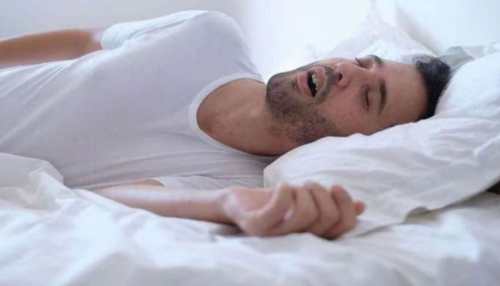- News>
- Health
Sleep Apnea: Expert Explains Causes, Symptoms And Treatment Of Sleeping Disorder

Dr Sandeep Nayar, Senior Director and HOD, Chest and Respiratory Diseases, BLK-MAX Super Speciality Hospital explains how sleep apnea can lead to a serious health problem, its symptoms and how to prevent this sleeping disorder.
Highlights
- Sleep apnea is a disorder in which breathing repeatedly stops for 10 seconds
- Two main types of sleep apnea are Central Sleep Apnea and Obstructive Sleep Apnea
- Expert Explains Causes, Symptoms And Treatment Of This Sleeping Disorder
After the sudden death of legendary singer Bappi Lahiri, sleep apnea has become a major health concern. It has been noted that sleep apnea may lead to chronic illness or may even cause sudden cardiac arrest. But what is sleep apnea? How is it caused? Sleep apnea is a disorder in which breathing repeatedly stops for 10 seconds or more during sleep. Two main types of sleep apnea are Central Sleep Apnea (CSA) and Obstructive Sleep Apnea (OSA).
Central sleep apnea is caused when the brain doesn’t send signals to breathe. CSA may result due to Neurological diseases, such as Parkinson's disease, involvement of the brainstem from swelling/infection (encephalitis), stroke, or injury. Other causes of CSA include Congestive heart failure, Hypothyroidism, Kidney failure, etc.
Obstructive sleep apnea is seen when there’s a problem with the mechanics of breathing. In adults, the most common cause of obstructive sleep apnea is excess weight and obesity, Other possible causes or risk factors for OSA include short neck, Hypothyroidism, deviated nasal septum, or any medical conditions that congest or obstruct upper airways.
Also read: Cardio Exercises May Help Lower Risk Of Death From Flu Or Pneumonia: Study
Smoking and alcohol or drug abuse can also worsen this condition. In children, OSA usually occurs due to enlarged tonsils or adenoids and some dental abnormalities. Childhood obesity (though not as common as in adults) or a tumour/growth in the airway, and birth defects such as Down syndrome may also result in OSA.
Dr Sandeep Nayar, Senior Director and HOD, Chest and Respiratory Diseases, BLK-MAX Super Speciality Hospital explains how sleep apnea can lead to a serious health problem, its symptoms, and how to cure sleep apnea.
Is Sleep Apnea A Serious Health Problem?
Dr Nayar shares, “Sleep Apnea if untreated can lead to serious problems. It can lead to multiple disorders including high blood pressure, stroke, angina, abnormal heart rhythm, heart attack, heart failure, diabetes, gastroesophageal reflux disease, and depression. Moreover, daytime sleepiness can result in lethargy, lack of concentration in work, and even vehicular accidents.”
What Are The Symptoms Of Sleep Apnea?
Dr Nayar explains 5 common symptoms of Sleep Apnea.
- Excessive snoring at night
- A spouse or someone at home who observes a patient while asleep would describe episodes in which the patient stops breathing and gasps for air during sleep.
- Awakening with a dry mouth and complaining of morning headaches.
- Excessive daytime sleepiness and difficulty in paying attention at work.
- Lack of sleep may result in forgetfulness, mood swings, and irritability.
How Can One Prevent Sleep Apnea?
Dr Nayar explains, “First of all we must find the cause of sleep apnea and try to treat it. Any obstruction in the airway like tonsils or adenoids in children may be treated by tonsillectomy or adenoidectomy. Any central cause like tumour or infection should be treated. Some mandibular advancement devices may cure symptoms in conditions like retrognathia. Some patients may benefit from surgeries on the upper airway but there might be a recurrence. The most common and gold standard treatment is the application of CPAP or Bilevel PAP overnight.”
“In addition, lifestyle modification like daily exercise, weight reduction, avoiding alcohol or sleeping pills at night, and quitting smoking definitely helps in getting rid of symptoms,” he further explains.
